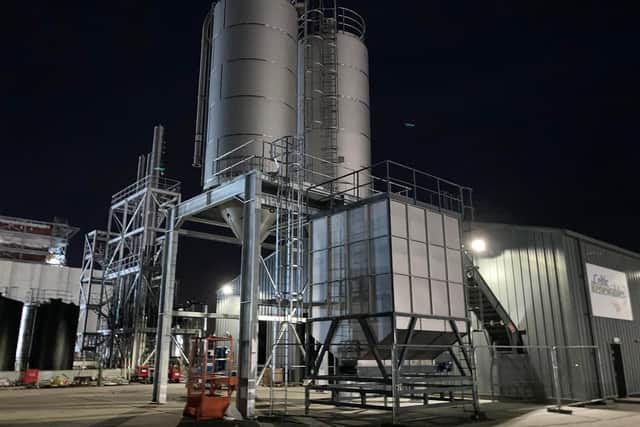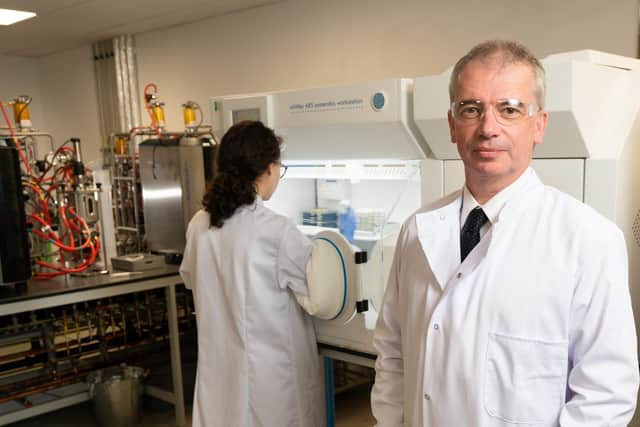Sustainable Scotland: A Scots-born firm creating biofuel from whisky waste has big plans for world domination
Professor Martin Tangney, founder and president of start-up firm Celtic Renewables, says he’s fed up with the doomsday scenario and being told all the things we can’t do if we want to tackle greenhouse gas emissions.
The microbiologist believes there is a “positive spin” for a green future.
Advertisement
Hide AdAdvertisement
Hide AdIt’s about growing the circular economy, where nothing goes to waste, and moving away from fossil fuels to biological technology.


“Our objective is to change the economy, taking stuff with limited use and upvaluing it,” he said.
“I’m all about what we can still do – just differently.”
And what his firm will do is turn organic waste from the likes of whisky distilleries and farms into valuable chemicals that can replace petroleum-based equivalents to make all sorts of everyday products – including motoring fuel.


The award-winning firm, which officially launched ten years ago, grew out of a scientific project at Edinburgh’s Napier University.
Today it has a team of 30 staff, including chief morale officer and medical alert dog Ekko, and is poised to begin commercial production of butanol, ethanol and acetone at its brand-new state-of-the-art processing plant at Caledon Green in Grangemouth.
The final trials and test of the technology are currently being carried out, with a view to beginning full-scale operation later this year.
When up and running, the facility will use its innovative technology to turn out one million litres of sustainable biochemicals each year.
Successful road tests have already proven cars can be run on their biobutanol created from whisky-making leftovers.
Advertisement
Hide AdAdvertisement
Hide AdHe said: “That’s one million fewer litres of petrochemicals that will be needed to make the things we use every day, from fuel to cosmetics and healthcare items, which will help to lower emissions.”
A new collaboration with Ardnamurchan Distillery and Woodlands Renewables, both based in the Highlands, will provide the Caledon Green refinery with supplies of whisky draff and pot ale.
The catalyst for the deal by the three companies was Donald Houston, of Ardnamurchan Estates, who has substantial stakes in all three companies.
The Scottish investor has been supporting Celtic Renewables since its outset, and the firm would not be where it is today without his “patient” backing, according to Prof Tangney.
“Money is one thing – of course it’s critical – but I think emotional collateral is also vital,” he said.
Mr Houston said: “Both Celtic Renewables technology and a new distillery such as Ardnamurchan Distillery require long-term financial investment before seeing any returns.
“The time taken to start commissioning the renewable plant and produce a saleable output is very similar to that of having a saleable whisky ready on the market.
“This long-term investment strategy, rather than the usual short-term commonly offered to start-ups, is crucial to the health of our economy.
“I am proud to be a part of this long-term view.”
Advertisement
Hide AdAdvertisement
Hide AdAnd the new Grangemouth plant is only the tip of the iceberg.
Celtic Renewables is aiming for world domination, with plans already being hatched to set up five further large-scale biorefineries across the globe in the next handful of years – with more to follow.
Prof Tangney, who is originally from Cork in Ireland, said: “The company has been evolving since the day it started and we’ll be looking at other biological residues in the future.
“This doesn’t start and finish in Grangemouth.
“The business may have been born and bred in Scotland but we have global ambitions.
“There is an appetite out there from people and businesses that want this to succeed.
“There’s more demand for green alternatives to fossil fuels than we can possibly meet.
“Expansion can happen at pace.”
A message from the Editor:
Thank you for reading this article. We’re more reliant on your support than ever as the shift in consumer habits brought about by coronavirus impacts our advertisers.
If you haven’t already, please consider supporting our trusted, fact-checked journalism by taking out a digital subscription.
Comments
Want to join the conversation? Please or to comment on this article.
